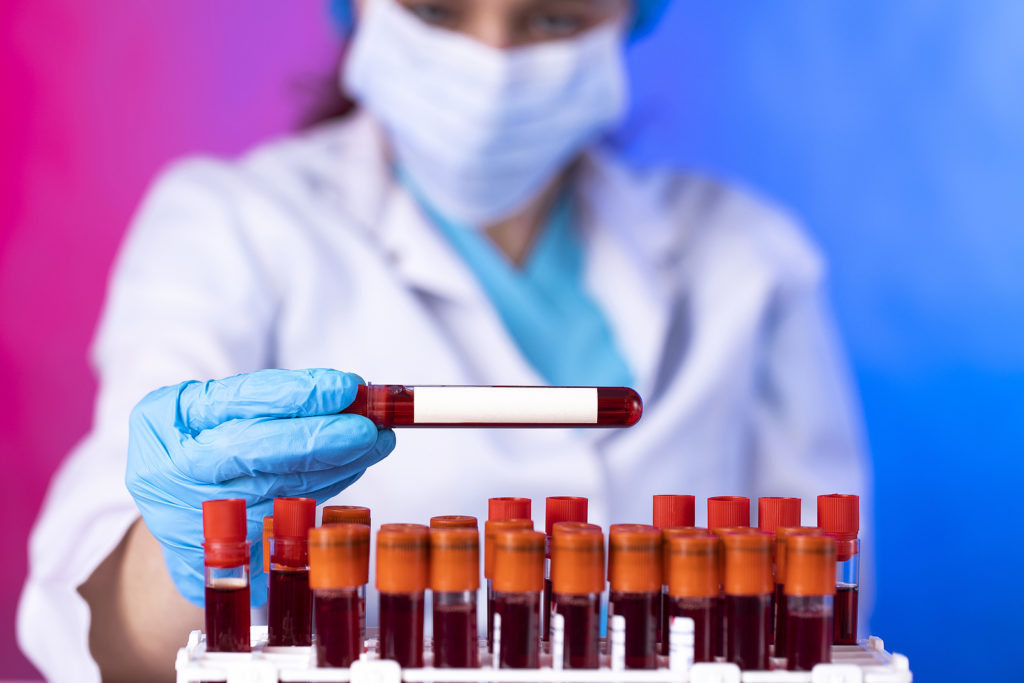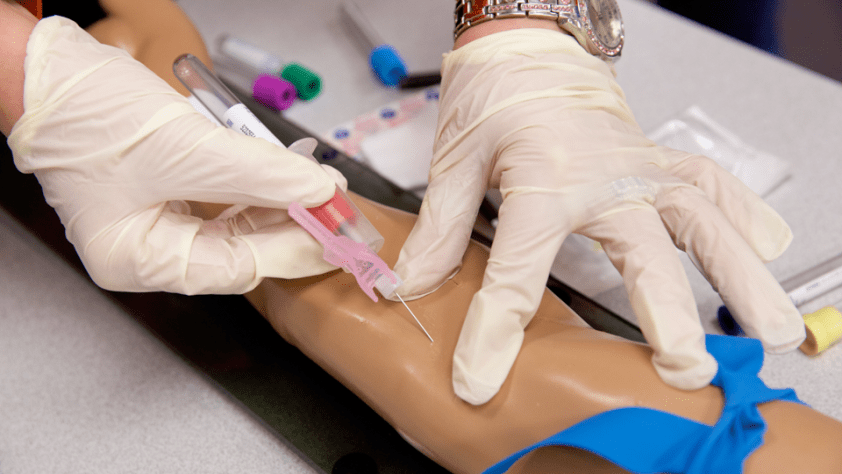Phlebotomy school: Where This Certificate Can Take You
The Path to Certification: Comprehending the Phlebotomy Educating Program Trip and Its Importance
As you consider the course to accreditation in phlebotomy, it's essential to understand the duty you'll play in health care. Your training will cover important abilities, from blood collection techniques to patient communication.

The Duty of Phlebotomists in Health Care
Phlebotomists play an essential duty in the medical care system, functioning as the essential web link between individuals and important analysis testing. You'll execute blood draws, guaranteeing samples are accumulated accurately and securely. Your knowledge aids in diagnosing clinical problems, checking health and wellness, and leading treatment decisions.
In your everyday communications, you'll need to develop trust with individuals, making them really feel comfortable during what could be a demanding experience. You're accountable for identifying and taking care of samples very carefully to protect against contamination or errors, which might influence examination outcomes.
Beyond this, you'll commonly function together with physicians and registered nurses, interacting essential information about clients' conditions. By mastering your skills, you add meaningfully to person treatment, making you a crucial component of the medical team.
Overview of Phlebotomy Training Programs
When exploring phlebotomy training programs, you'll locate numerous kinds created to fit different schedules and learning styles. Each program helps you create crucial abilities like blood collection and individual interaction. Understanding these alternatives is vital to picking the ideal path for your profession.
Types of Educating Programs
A number of types of training programs are available for those looking to come to be efficient in phlebotomy. You can select from certificate programs, which commonly last a couple of months and concentrate on vital abilities. There are also diploma programs that give a more complete education, usually lasting approximately a year. If you're searching for a much deeper understanding, an associate degree in a relevant field could be the ideal fit. Online programs offer adaptability for those balancing job or family dedications, permitting you to examine at your very own pace. In addition, some health centers and centers use on-the-job training programs, offering practical experience while you discover. Whatever path you select, each program aims to equip you with the necessary abilities for a successful phlebotomy job.

Trick Abilities Created
Mastering phlebotomy requires a set of key skills that are developed through comprehensive training programs. You'll find out technological abilities like correct blood vessel option, needle insertion, and blood collection methods. These hands-on methods ensure you can carry out procedures safely and efficiently. Furthermore, interaction skills are essential; you'll need to interact with patients, clarify treatments, and placed them at simplicity. Comprehending makeup and physiology is critical, also, as it aids you find capillaries and understand the body's response to blood attracts. Lastly, you'll acquire knowledge of safety and security protocols and infection control, assuring you keep a clean and sterile atmosphere. Each of these skills is essential for your success as a qualified phlebotomist, making you an important asset in any kind of health care setup.
Key Elements of a Phlebotomy Course
In a phlebotomy training course, you'll concentrate on necessary topics that prepared for your future job. You'll participate in hands-on training that enables you to use what you've found out in real-world settings. Both the core curriculum and functional experience are vital for your success as a phlebotomist.
Core Educational Program Review
While pursuing a phlebotomy training program, you'll encounter a curriculum made to equip you with essential abilities and expertise. Phlebotomy Courses Near Me. This curriculum typically consists of anatomy and physiology, concentrating on the circulatory system and comprehending blood parts. You'll additionally discover various kinds of blood collection approaches, consisting of venipuncture and capillary puncture techniques
Furthermore, infection control and security procedures are crucial components, ensuring you understand exactly how to keep a sterile environment. You'll study patient interaction, emphasizing communication and empathy, which are crucial for easing individual anxiousness. Finally, ethical and legal considerations will be addressed, preparing you for real-world responsibilities. This fundamental understanding will allow you to succeed as a phlebotomist and supply high quality care in clinical setups.
Hands-On Training Experience
Getting hands-on experience is a crucial part of your phlebotomy training program. This practical training enables you to use what you've found out in a real-world setup, boosting your abilities and self-confidence. Phlebotomy school.
In addition, you'll get the opportunity to interact with clients, which is essential for establishing your interaction skills. This mix of technological proficiency and interpersonal abilities is critical for your success as a licensed phlebotomist. Inevitably, hands-on training is where concept meets method, strengthening your knowledge and readiness for qualification.
Qualification and Licensing Requirements
Before you can start your occupation in phlebotomy, it is essential to understand the certification and licensing demands that differ by state. Many states require phlebotomists to hold an accreditation from an identified organization, such as the National Phlebotomy Organization or the American Society for Clinical Pathology. These qualifications usually involve passing an examination that examines your knowledge and skills in the field.
Along with certification, some states have particular licensing demands. You read more may need to complete a specific number of hours in clinical technique, submit proof of training, or go through a background check. It is essential to investigate your state's guidelines to make certain you fulfill all needed requirements.
Staying notified about these requirements not only aids you safeguard a setting but additionally boosts your reliability as an expert. By satisfying these requirements, you'll be well on your way to a successful occupation in phlebotomy.
Hands-On Training and Practical Experience
Hands-on training and practical experience are necessary elements of your phlebotomy education, as they allow you to use academic knowledge in real-world situations. Throughout your training, you'll take part in supervised venipuncture, find out correct methods, and become acquainted with different blood collection equipment. This straight involvement is crucial for building your self-confidence and developing your skills.
You'll work very closely with knowledgeable professionals that can direct you through the subtleties of patient communication and sample handling. Each technique session not only reinforces your understanding yet additionally prepares you for the fast-paced setting of health care setups.
Furthermore, numerous programs include scientific rotations, permitting you to experience diverse settings, from healthcare facilities to outpatient clinics. This direct exposure helps you adjust to different difficulties and patient demands, ensuring you're well-prepared for your future role. Accept these opportunities, as they're vital to coming to be an experienced and caring phlebotomist.
Obstacles Dealt With Throughout Training
While gaining hands-on experience is essential, it is very important to identify the challenges that can develop during your phlebotomy training. You could encounter anxiousness when executing procedures on genuine people, especially if you're new to the atmosphere. The stress to obtain everything right can be frustrating. In addition, mastering the abilities needed for blood attracts takes technique; you may fight with method at first.
Time management can likewise be an obstacle, as harmonizing concept, functional sessions, and individual dedications can view it really feel challenging. You may deal with varying discovering rates among your peers, leading to feelings of self-doubt if you assume you're dropping behind. Adapting to the different personalities of instructors can be challenging, as each might have an one-of-a-kind training design.
Acknowledging these challenges early can prepare you for success and aid you develop resilience throughout your training trip.
Occupation Opportunities After Accreditation

As you get experience, you might even consider focusing on locations like pediatric or geriatric phlebotomy, satisfying details client demands. Some phlebotomists pick to advance their professions by coming to be research laboratory specialists or going after more education in health care areas.
In addition, your certification can cause duties in training or monitoring new phlebotomists, permitting you to share your expertise. With the healthcare market continually growing, your skills will certainly constantly remain in need, paving the way for a stable and satisfying occupation. Welcome the possibilities waiting on you!
Frequently Asked Questions
What Is the Common Period of a Phlebotomy Educating Course?
Phlebotomy training courses usually last around 4 to 8 weeks. You'll involve in hands-on technique, class guideline, and on-line understanding. Finishing this training prepares you for qualification and a rewarding career in healthcare.
Are Online Phlebotomy Courses Available?
Yes, online phlebotomy courses are available. They offer adaptability and ease, permitting you to research at your very own rate. Simply confirm the program is recognized to satisfy accreditation requirements and acquire valuable abilities for your job.
Just How Much Does Phlebotomy Training Normally Expense?
Phlebotomy training usually costs between $700 and $2,500, depending on the program and area. You must think about elements like course size, consisted of materials, and hands-on experience when find choosing the appropriate training for you.
What Prevail Prerequisites for Phlebotomy Training?
Typical prerequisites for phlebotomy training usually include a senior high school diploma or GED, immunizations, and a history check. Some programs may additionally require standard healthcare expertise or certifications, guaranteeing you're gotten ready for hands-on training.
Can I Work While Completing My Phlebotomy Training?
Yes, you can function while completing your phlebotomy training. Several trainees equilibrium jobs with their researches, but make specific to handle your time successfully to guarantee you fulfill both work and training dedications efficiently.